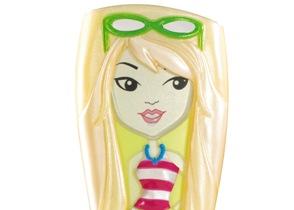Mattel's BarbieGirls Virtual World Needs to Reboot

Girls Just Wanna Have Fun
Whether or not you identify as post-feminist, there can be no doubt: Barbie is Fierce. The Mattel rainmaker consistently ranks among Interbrand's top 100 global brands and is #1 for girls toys. The iconic doll, closing in on her golden anniversary, represents a three billion dollar business.
While Margaret Talbot wrote in The New Yorker last winter that Bratz dolls were gaining in Barbie's rear view mirror, summer saw the flop of Bratz: The Movie, while BarbieGirls, Mattel's entrée into virtual worlds, claims to have attracted four million members, growing at a rate of 45,000 a day (as compared to Facebook's 10,000 sign-ups a day). But is this virtual juggernaut for real?
The media was quick to take up a "comeback" angle for the declining brand, in the face of Mattel's unprecedented toy recall, but few have dissected the experience itself. While BarbieGirls remains in beta (it's scheduled to "go live" sometime in September), an early critical assessment is not only instructive, but urgent.
In an exclusive interview with Jack Myers Media Business Report, Prof. Justine Cassell of Northwestern's Center for Technology & Social Behavior (author of Beyond Barbie and Mortal Kombat: New Perspectives on Gender and Computer Games) went online with us to play and explore BarbieGirls.
At the outset Cassell is quick to point out that for all the Barbie-bashing, psychological testing has routinely confirmed that while "we grownups see Barbie as a blond bombshell, girls see her as a blank palette to project their identity onto." The purpose then of this feature is not to bury Barbie but to examine the virtual world in the context of a space for girls.
In-World
After we jointly sign in Cassell notes that she's "struck how little has changed from the Barbie site created back in 1999. By how notexpensive this is. This didn't take a lot of thought or money." (Mattel claims that it had a two-year R&D process.) Cassell opines that "the Rules are so 'heavy.' What can you do?"
Indeed. The recent CTIA Wireless Survey (Cellular Telecommunications and Internet Association) found that 85 percent of U.S. parents believe that the Internet "posed the most risk for teens." But this is perception, not reality. As Prof. Larry Rosen (author of the forthcoming Me, MySpace and I: Parenting the Net Generation) notes, MySpace's blocking of 29,000 sexual predators amidst its total population of 70 million+ users constitutes four one-hundreths of one percent. Further, in his studies a majority of teens reported inappropriate behavior and didn't feel intimidated. So ingrained in our culture is this anxiety that when Cassell queried a sixteen-year-old about Web 2.0 she answered, "That's when it's harder for people to troll you." In her paper "High Tech or High Risk: Moral Panics About Girls Online" Cassell questions, "Can girls ever be high-tech without being in jeopardy?"
As our popular culture has noted the phenomenon of KGOY: "Kids Getting Older Younger" Barbie fans are aging out before their teen years (the age range was formerly 9-12; now it's closer to 3-6 years of age). Perhaps by adding the element of a virtual world, Mattel hopes to redress this (their spokesman holds that 90% of BarbieGirls's members are age 8 or over).
Cassell and I begin in our respective cribs. We mod out our avatars and spend our $B Bucks to furnish our bedrooms. Teleporting into Club Beauty we are easily able to meet and greet, but our chats are circumscribed. In the interest of safety, names and numbers are blanked out. But beyond that many words — 3,000 according to a Mattel spokesperson — are also likewise censored. Cassell doesn't want a pedicure. Instead she asks her new friends, "Does anyone want to write poetry?" Poetry is blacked out. [Note: Mattel will shortly be changing this form of chat to a list of drop-down menus. Stay tuned to see if it enhances or further undermines conversation.]
One way to ensure greater expression is to purchase the BarbieGirls device ($60) which is something of a technological Swiss Army knife. It's an MP3 player with 512K capacity (expanding to 2G with a card) and it's also a "key" for less filtered, or Secret B Chat. That is, if you are both physically proximate. Cassell would have to "dock" her BarbieGirl in my cradle so that we could furthermore have Secret B Chat. That sounds more like a Chastity Belt than a key. What of pen pals? Again, safety first.
We linger at B Café (where I could ask for a milkshake, but not…fries) and watch some trailers at B Cinema (to earn $B Bucks). Cassell: "It's not just that it's a world of gossip and clothes, it's reinforcing stereotypes. She is all talk, rather than action. It's surprising that here we are still talking about this more than a decade after the first girl games came out. There was no action in them then. This is the wrong translation, just because there's no violence doesn't mean that a game should be action-free."
In her autobiography Dream DollBarbie creator Ruth Handler writes of the moment that incited Barbie: "They were using (paper) dolls to project their dreams of their own futures as adult women. It dawned on me that this was a basic much needed play pattern that had never been offered…" As we are sitting in the B Café waiting for our snacks, I type, "Does anyone want to dream?" The word "Dream" itself is veiled.
Cassell worries that such games (more broadly than just BarbieGirls) are "positioning girls as disempowered with respect to technology." A virtual world is where you build robust identities and have adventures (think Club Penguin, Webkinz). In the UK Mattel is currently running a "B Who U Wanna B" campaign. Kirsty Bullen, Mattel Girls' marketing manager across the pond, states that "Barbie is about inspiring and empowering." May we suggest a little less gatekeeping and a bit more aspiration in your next release?
With the August beta launch of the virtual world Be-Bratz.com (complete with its own USB "key") Barbie is against up against its main rival. Just as safety is a legitimate criterion in an online world, both Barbie and Bratz should realize that a commitment to providing players a good experience holds for ALL ages.


